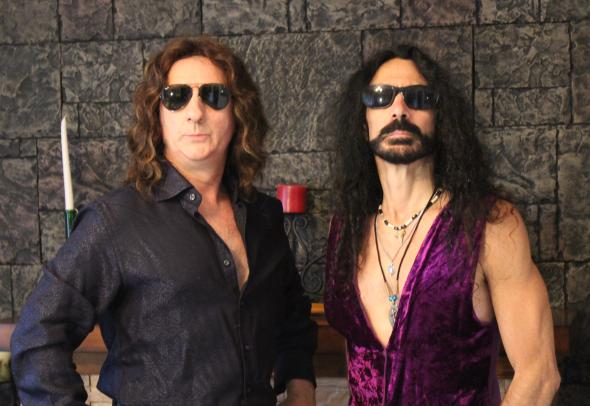
[Continued from Part 1]
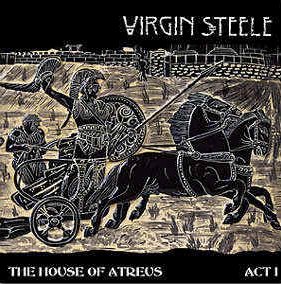
THE HOUSE OF ATREUS: ACT I [1999]
By the fucking Hammer of the Gods, immediately following the heels of their iconic operatic trilogy, DeFeis being the absolute mad-man he is decided to make an actual Opera. Quite literally, for these House of Atreus albums were turned into a musical theatre play Klytaimnestra that was performed by German production company Landestheater Schwaben from 1999 to 2001. (Its’ apparent success led to a following theatrical production based on “The Marriage” trilogy entitled The Rebels).
Two things need to brought up when initially introducing this first installment in the Barbarbic Romantic adaptation of Aeschylus’ Oresteia cycle. First of all, the bombastic 7-minute opener “Kingdom of the Fearless (The Destruction of Troy)” is absolutely insane, a contender for the greatest Virgin Steele song ever, and so vastly eclipses the numerous other discs-worth of material comprising the rest of the House of Atreus cycle that it is almost to this record’s discredit that it contains such a beast of Superion. Secondly, regarding the rest of Act I, this album can be unnecessarily difficult to get into. This record consists of a whopping 22 tracks comprising a 74-minute disc, more than half of which consists of various interludes of an instrumental, narrative and/or transitional nature. To be fair, most are not necessarily bad, in fact some are kind of cool, and they all (of course) serve a unifying narrative purpose that is perhaps best understood when following along with
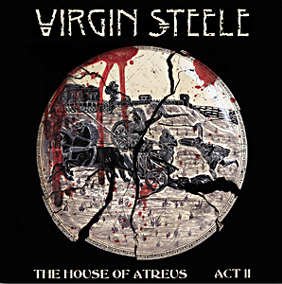
THE HOUSE OF ATREUS: ACT II [2000]
The second and concluding installment in The House of Atreus cycle is a double album, however divided into two easily digestible ~40-minute CDs as opposed to its 70+ minute single disc predecessor. As one can imagine taking that fact into account, Act II manages to improve over some of the issues with the previous entry while still leaving much to desire.
While there is no “Kingdom of the Fearless”-level masterpiece to be found here (or perhaps any other album to be fair), the entire first disc is perfectly solid, jam packed with great tunes, and easily has the best flow of the 3 discs of Atreus. The interlude/minor tracks on Act II Disc 1 are mostly inconspicuous and are greatly out-numbered by the 6 actual songs which comprise the CD. The fact that the (relatively, arguably) weakest tune here is an Exorcist song [“The Fire of Ecstasy”, an slightly neutered re-imagining of “Call for the Exorcist”] is a demonstration of the consistency in quality which reaches its’ peak on highlights “The Wine of Violence” and “A Token of My Hatred”.
However, as opposed to Disc 1’s consistent flow, the 2nd Disc here is almost entirely bland and devoid of substantial content. Opener “Flames of Thy Power (From Blood They Rise)” is a cool anthem, however the rest of the second disc essentially just consists of tired-sounding ponderous suites and BALLADS.
In summation, the present author’s final verdict on The House of Atreus cycle is that if all the best material were reduced to a single disc it would be a masterpiece among their best, however the excessive and varied nature of the triple-disc extravaganza makes them a general sort of “skip-to-my-favourite-tracks” affairs except for the rare occasions when one has the patience to become fully immersed in the DeFeis classical theatre experience .
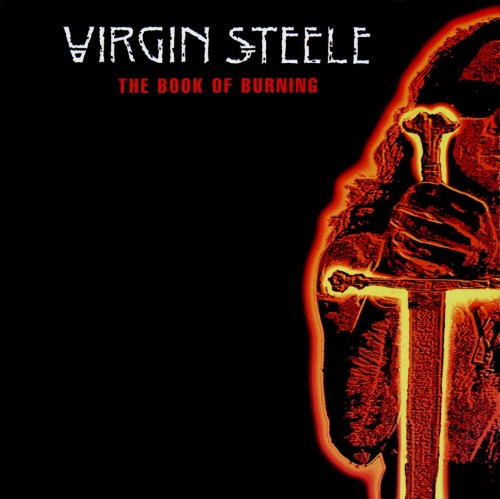
THE BOOK OF BURNING [2001]
Released alongside the remastered/re-mixed “greatest hits” compilation Hymns to Victory for the band’s 20th anniversary, this record is included here due to DeFeis’ insistence that it is a proper full-length; as well as it being the first recording to feature new loyal member and talented second guitarist/bassist/etc. Josh Block alongside the classic team of DeFeis, Pursino and Gilchriest.
The Book of Burning consists mostly of re-recorded songs from the Jack Starr era along with some Original Sin “covers”, and a few “new” previously unrecorded songs that mostly originate from a failed attempt at a DeFeis / Starr re-union project during the late 90’s. The rationale behind such re-recordings was apparently due to the first two records being out of print and DeFeis feeling that with the band’s current level of maturity they could breathe in new energy which he felt the early recordings did not have. [A personal snub at Starr or circling around licensing restrictions were surely not factors].
While DeFeis confidently believes these new versions surpass their originals, the present author is not convinced that this is entirely the case. The renditions of “Children of the Storm” and “The Redeemer” are improvements, however most of the other Guardians of the Flame and Original Sin songs do not quite match the original 80’s vigour (although the version of “Succubus” here is quite cool). The new songs are mostly unremarkable, aside from the bizarre borderline-“alternative” 90’s cringe of “The Final Days” which earns a distinction of being the worst Virgin Steele song (at least up to that point) and a probable indicator that it was for the best that this brief break in the lengthy DeFeis / Starr feud was as short-lived as it was. It goes without saying this is not an essential record.
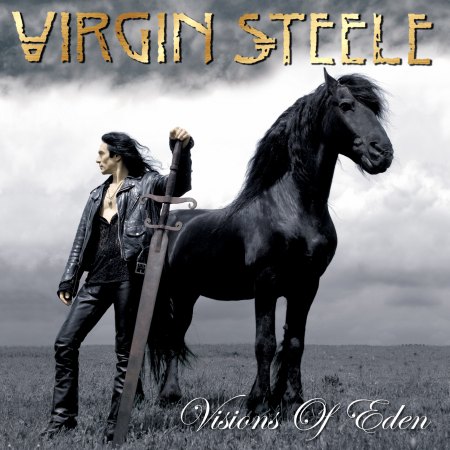
VISIONS OF EDEN [2006]
Visions of Eden: The Lilith Project – A Barbaric Romantic Movie of the Mind. This mouthful of a release actually originated as DeFeis’ third theatre production with Landestheater Schwaben where it was first performed in 2003 under the title Lilith. An extremely divisive record in the band’s history, for many people this is where they begin to tune out. As shall be examined, it is understandable why this is the case, however amidst the various idiosyncratic “flaws”, the present author is of the opinion that there is significant musical quality to be found for those who make the effort. The original Lilith production consisted of over 60 pieces of music, however due to apparent pressure from the label, DeFeis wound up limiting the final album to 11 densely composed songs; thus Visions of Eden does manage (at least on one level) to remedy some the issues of the previous operatic cycle. However, this did not necessarily end up with a more approachable product; for the production, song-writing and instrumentation is rather different than before and thus this record earns the reputation of being inaccessible for many fans. If Invictus was the record that most embodied the “Barbaric” aspect of Virgin Steele’s “Barbaric Romanticism”, Visions of Eden is the most “Romantic” record which sacrifices some of the full-on thrashing riffage for elaborate symphonic composition and emotional operatic dramaticism.
Indeed, while the band has for all intents and purposes been DeFeis’ brainchild since the Noble Savage era, starting here the material released under the Virgin Steele moniker would become even more of a fully DeFeis controlled product. For this is the first album where every single song has been written entirely by “The Lion” without any external input; plus instrumentally DeFeis managed to take care of all bass duties, and alongside Pursino and Block contributed much of the guitar-work (including even the leads on some tracks) in addition to his omnipresent vocals and layers of piano/keys. This is also the first album where DeFeis took control of the engineering in addition to production aspect, and accordingly one of the most common complaints against this release (and all those to follow) is the bizarre quality of the sound. While the official 2017 “Barbaric Re-Mix” of this album has gained much appreciation for fixing some of the issues with the original release, such as the relatively weak-sounding buried guitars, the main “problem” of the surreally artificial digital sound remains, even if it does now sound slightly more clear and significantly more powerful.
As previously mentioned, while all frivolous interludes have been eliminated leaving only core developed pieces, this 79-minute record which just barely meets the max length for a CD is densely packed and the new style of song-writing makes some of these pieces difficult to wrap around, at least on initial listening. The songs have a tendency to follow what the present author dubs a “detour” structure that generally starts through the initial cycling or two of a verse-chorus pattern, then proceeds to “detour” into an extensive diversion that goes through multiple progressive stages (such as extended Musical-esque vocal-led soliloquies, new nested verse/chorus patterns, and/or instrumental fiddling, etc.) before eventually returning back to the original chorus/verse and concluding on a climatic reprisal of a dramatic main theme. On a few tracks, these “detours” manage to take a previously compelling piece into some aimless diversions or awkward turns (unfortunately not unlike some modern “prog”), however much of the time they do actually function well once one listens enough to wrap their head around the pattern. Perhaps following alongside DeFeis’ exuberant dramatic enactments of cinematic excellence for some these pieces can aid in attuning one’s mind to the flows of such detours, or at least feel the emotion inherent in the composition.
Despite the unusual production and occasionally awkward song structures, it may surprise some that the present author considers this to be a Top 5 Virgin Steele album. The fact that these pieces were clearly originally written for and based around the piano instead of the guitar gives these pieces a new feel that can come across as unfamiliar to the typical Power Metal listener. However, throughout these new breed of songs, there is a genuine sense of forceful vibrant emotion which comes through this material, and at its peaks the atmosphere on hand evokes some of the most “massive” sensations of epic cosmic grandeur in all of Virgin Steele’s discography. This album represents the (perhaps difficult) birth of a new sophisticated approach to the compositions, and the present author is of the opinion that this record is filled with several of the richest melodies of DeFeis’ career, especially the jaw-dropping opener/highlight “Immortal I Stand (The Birth of Adam)”.
While this record’s reach often exceeds its’ grasp, it deserves appreciation for being quite possibly the single most ambitious disc in the group’s catalogue, and managing to manifest some highly euphonious melodic themes along its way. It would probably be best for prospective Virgin initiates to keep their distance from this difficult recording when first embarking on their journey of Steele; however when the time comes for the now seasoned listener to give it a chance, perhaps refrain from snap reactions and give it a few attentive listens before forming one’s personal judgement on this controversial outing.

THE BLACK LIGHT BACCHANALIA [2010]
YAOW! By the Black Sun and Moon, we have now most certainly become enshrouded in the chthonic realms of an aural landscape far beyond any resemblance to previous familiarity.
With the directly preceding release, the fans were split between those who felt it was an abortion and those who saw it as a misunderstood masterpiece – with most falling somewhere in the middle, and all being united in their distaste for the releases immediately following The Black Light Bacchanalia. No one seems to know quite what to make of this unorthodox outing. The present author will frankly state at the outset that they love this album to death and personally consider it to be the greatest Virgin Steele release besides The Marriage of Heaven and Hell: Part Two.
Out of all the adjectives one could use to describe past Virgin Steele music, “subtle” would likely be one of the last words to come to mind. The Black Light Bacchanalia however is a dark, sophisticated recording that sounds entirely different from anything the group had ever done, and is indeed full of subtleties, on both a compositional and emotional level. This album can be said to build upon the previous record’s new approach to composition, however the material on hand has become more mastered and refined; with a completely unique snarling subtle Gothic mood that manages to stylistically depart even farther from typical Power Metal expectations, yet has ultimately become more directly fierce and powerful in its’ own unconventional manner. Taking inspiration from Chopin and Debussy, the subtle yet bombastic compositions and their “mutant riffing” [to quote DeFeis] blend Gothic Chromatic tendencies into the symphonic-based romantic outings, adding more shadowy mystery and blood-lusting fury than Visions of Eden. This dense pathos-surging sound forms to create a highly uncanny and effective atmosphere in the form of everything from surreal orchestral epics [such as “To Crown Them with Halos” and the iconoclastic title track], to BALLADS that reach to the depth of one’s sorrows, [such as “The Torture’s of the Damned” and “Eternal Regret”], to vicious incantations of vengeful desecration [such as “The Bread of Wickedness” and the present author’s personal favourite VS song “BY THE HAMMER OF ZEUS (AND THE WRECKING BALL OF THOR)”].
With threats to rip the Judeo-Christian “god” and tear his “fucking kingdom” from “the sky”, the themes of inverting Abrahamic archetypes and exulting scorned muliebral and Pagan conceptions of divinity continue from the last album. However as opposed to the diurnal sing-song energy of that record and all previous VS material, the mood of this record is a more shadowy, Gothic nocturnal affair calling to mind Atavistic preternatural reverie, esoteric rites of pagan transformation, forbidden romance, sinister lust for vengeance, total rebellion against usurping forces of alien spiritual control, and the sorrowful desolation of fatalistic tragedies both personal and Aeonic in nature.
If there is any serious issue to be found here [aside from the awkward “detour” comprising the middle of “Necropolis (He Answers Them with Death)”], it is, of course, the production. Naturally, the audio manages to sound even more “artificial” than Visions of Eden, although the cold and bizarre sound does kind of work better with the mood here. The main problem, however, is that as opposed to Eden which buried guitars under layers of symphonics, some of the greatest keyboard/piano/symphonic passages are not mixed as loudly in key places where even grander climatic harmony with the guitar surge could have been emphasized, thus the buried/flat nature of the mix actually obscures the majesty of some of these compositions to the un-attentive new listener. In recent interviews DeFeis has voiced potential plans to create a Re-Mixed release of this album, which the present author awaits eagerly.
As a disclaimer, most fans do not tend to hold this record in especially high regard, and certainly not to the extent expounded here. While the present author could care less about the inevitable hubristic comments whining about the enthusiastic appraisal of this release, it will be admitted that this is definitely the single most inaccessible record in the band’s discography, exponentially more so than even Visions of Eden. Especially for one expecting another Invictus or Noble Savage, this is a very different style of song-writing to initially get used to; and the compositions are even more densely and iconoclastically written than beforehand with it generally not becoming fully clear all that is going on in most of these tracks until the familiarity of multiple listens. To say nothing of the previously discussed issues in the engineering/mixing department which only serve to further obscure the presentation for the un-initiated.
To the honest intrigued listener that desires to find this record more approachable, the present author recommends giving (potentially) several attentive listens free of any stylistic expectations, and every time follow the band’s perennial advice to “play at Maximum Volume”… ideally on powerful speakers so as to not fall prey to the deceptions of a covered head.
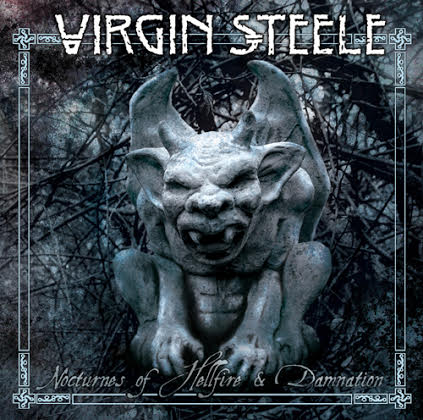
NOCTURNES OF HELLFIRE & DAMNATION [2015]
This is where just about everyone tunes out. It is not entirely clear what happened here. The feel of the production has become even more hollow/artificial sounding to the point that DeFeis for some reason decided to opt for using a drum machine instead of a top tier human drummer that had been with the band for two decades. Although there may have been previous hints that DeFeis’ voice is not quite what it used to be, he managed to work around this with various interesting techniques such as low quasi-whispering moody predations and hypnotic trilling lilts that worked very well with the atmosphere and compositions of The Black Light Bacchanalia. However it is somewhat disconcerting to now hear one of the most powerful voices in Heavy Metal lose all previous sense of fullness or low-end, and is now reduced to dog-whistle falsettos bathed in reverb effects, alongside plentiful roars of “YAOW” and other characteristic croaky noises which even the present author (who always found such exclamations to be euphorically exciting) admits can now be a bit grating at times. While the first half of this record is at least listenable and has a few okay moments (mainly the two re-recorded Exorcist songs which are nothing compared to their 1986 originals), everything immediately following the amusing Robo-Cock Rock of “Demolition Queen” is a total slog to sit through. The fact that one of these tracks actually opens with an edited recording of DeFeis sneezing should say it all.
This is an extremely disappointing affair – not least after the iconoclastic brilliance of the previous record – and overall probably the weakest Virgin Steele outing to date. Perhaps the most damning (heh) indictment of this record is that the present author – who, in case you can’t tell, has recently transformed into one of the wildest VS fans you’ll ever meet – cannot get into this record at all, no matter how hard they try.
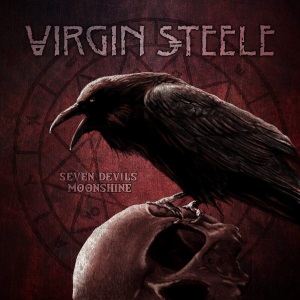
SEVEN DEVILS MOONSHINE [2018]
True to his Dionysian insanity, less than half a year before the writing of the present article, DeFeis decided to release a 5-CD boxset containing three [!] new albums alongside re-issues of Hymns to Victory and The Book of Burning. There are many highly varying styles and elements found across Gothic Voodoo Anthems, Ghost Harvest (The Spectral Vintage Sessions): Vintage I – Black Wine for Mourning and Ghost Harvest (The Spectral Vintage Sessions): Vintage II – Red Wine for Warning . From “stripped down” “Orchestral”/Piano renditions of tracks from various eras of the band’s history, to bizarre stylings of “gothic blues” with plenty of twisted BALLADS, plus covers of everyone from The Doors and Led Zeppelin to Alice in Chains and a 9-minute [!] rendition of Chris Isaak’s “Wicked Game”.
It goes without saying that the overwhelming fan reaction to this release has been even more negative than the previous outing, mostly for good reason. However despite the fact that this is clearly among the very lowest echelons of the band’s career and may even sound unlistenable to some people, there is at least some interesting material on hand for the morbidly curious listener. [Either that or the present author has fully descended into syphilitic levels of VS fanboy insanity]. There are a few pretty cool themes/melodies scattered about such as on “Child of the Morning Star”. The production has somehow become even more totally artificial to the point that the Ghost Harvest records seriously sound like they were made with MIDI instruments; but there is at least some fun lead guitar action by Pursino on ditty-jam “Green Dusk Blues”. As he has hinted in interviews, it is detectable that some of these tracks have genuinely dark, disturbing personal significance for DeFeis, even if they don’t quite end up expressed into the context of a fully cohesive composition.
The present author has personally always been fascinated with acoustic/8-bit/piano/etc. interpretations of Metal compositions. Accordingly, while the so-called “orchestral” renditions of the Marriage and Atreus tracks here are frankly egregious [especially “I Will Come for You” :,( ], easily the main (and really only) highlights are the majority of the other “stripped down” tunes; especially for The Black Light Bacchanalia songs which do bring out a vivid look at the compositions taken out of an externally “Power Metal” context that may have been cause for their initial misunderstanding. (Although DeFeis’ “idiosyncratic” Nowadays vocalisations may probably not aid in making these pieces more accessible for sceptics).
However, despite the “interesting” (for better and worse) renditions of old songs, and a cool melody here or there, the majority of these 3 discs are ultimately not very good to put it as nicely as possible. Unless you have already reached VS-fanboy levels approximating the present author, it is advised that you listen to basically any other release featured in this article.

[A Based and Dog-Pilled Photo of the Son of the Sun Born to No One]
Despite closing off on that potentially drab note, the present author will let it be known that they will always admire and respect DeFeis for the decades-worth of wonderful music he had been creating up until very recently; along with his genuinely inspirational high-energy personality and unique mannerisms. Almost two months were spent on writing this guide, inspired entirely by the pure feelings of exuberance for life that this music inspires within myself. Hopefully this guide may have resulted in transmitting some of these sensations of admiration and excitement on to the present reader.
“Well, I think the main message of Virgin Steele is to maintain your honour and your dignity in the face of extreme adversity, fear nothing, and celebrate the power and the triumph of the human spirit, and continually push the envelope musically (if you’re a musician), and try to achieve the impossible and the unexpected, and follow the music of your head, heart, mind, body, spirit… and in general have as much sex as is humanly possible.”
– David DeFeis

AUTHOR UPDATE FEBRUARY 2020
This article in many ways represents an encapsulation and conclusion of where I personally was at on many levels back around Late 2018/Early 2019, and accordingly I have no desire to change a word of it, and shall indeed let it stand as the snapshot in time that it is.
However, as there are now a few judgements made in this article which I no longer agree with, as well as others I held at the time but regret not emphasizing enough, I feel the need to make the following “clarifications” known for posterity, especially if DeFeis or anyone else are to ever stumble upon this article in the future:
1. I should have made a point of mentioning that the Original Sin album is also fantastic and not too far beyond Nightmare Theatre in it’s own right. The Piledriver album is good too.
2. I have unironically come to realize that there is no spiritually higher art form than “80’s Music”. Accordingly Age of Consent is now my favourite VS album, and “On the Wings of the Night” is currently a very strong contender for my favourite song in all of music. I even like “Serpent’s Kiss” now, as out of place as it is!
3. While we are on the subject of the soteriological nature of “80’s Music”… Life Among the Ruins is a 10/10 album which immediately rose to become one of my favourites not long after this article was originally published. I love every single song on it more than life itself, and regret that I did not actually discuss in depth that the music was actually really good, out of some weird self-conscious concern that it may scare off the “no-fun death metal” types around here… also there is no need for anyone to help me find those “Interviews”, as I have now acquired the VHS in question! Those news reports on the other hand, would be interesting…
4. I appear to have come off as unnecessarily harsh towards the mostly-exceptional House of Atreus cycle here. While I still hold that they would have been better off if the trilogy’s size was significantly reduced, Act I (including the transitions) does flow pretty fine front to back. Act II Disc 2 is indeed still the most dragging part of the whole series, however I appear to have totally over-looked the powerful BALLAD “When the Legends Die” which is now one of my favourite songs from all 3 discs.
5. The re-recorded version of “The Redeemer” is not better than the original. I have no idea why I wrote that.
6. Visions of Eden is an absolute masterpiece, perfect in every way, and possibly one of the most profound works of art ever created. I somewhat regret that I spent shitloads of paragraphs nitpicking little technical shit with only one small paragraph actually praising the music, but this was more defensible as the nitpicking paragraphs were intended to methodically persuade initial doubters to give the album a proper chance, and the short paragraph did heap some pretty overzealous praise in it’s own right. Besides, it was only in the last half of 2019 that much of the album began to speak to me ever deeper…
7. I don’t know if I can still justify calling The Black Light Bacchanalia number 2… it is still a savagely underrated masterpiece however, and I stand by every word I wrote about it. Basically, Age, Life, Marriage, Eden and Black Light are my definitive Top 5 with the specific order more or less fluidly changing based on which ever one is “speaking to me” the most at a given point in my life…
8. Nocturnes is okay, I exaggerated it’s flaws probably to make it seem like I’m not a total fanboy. It’s like a 6/10. Half the album is genuinely good songs with weird vocals/production, the other half are just boring, not really bad or anything. If anything the 1982 debut is actually the “worst album”, or at any rate, it’s by far the one I actually listen to the least.
9. Yeah, fuck me, I was wrong… Ghost Harvest – Black Wine for Mourning is genuinely really fucking good! I was right that due to the unusual vocal/production style it’s perhaps not for casual fans, but I was absolutely mistaken to ever imply that it was anything short of exquisitely composed and emotionally powerful. “Justine” is genuinely heart-breaking, “Hearts on Fire” has one of the most insane riffs I’ve ever heard in my life, and I now overall stand by the value of every other original song on that specific CD. Red Wine for Warning also has some interesting stuff going on in places…
Forgive me DeFeis, my Lord!
—
All that said, it would seem most fitting to conclude this post-script with an astutely pertinent quotation from God Himself:
“VIRGIN STEELE albums take time to absorb and to fully comprehend. There is so much going on musically, lyrically, emotionally, that it often can take years to fully understand some tracks. It is meant to be this way. The songs are meant to be companions on your journey through life! And as you change, the ideas both musical and otherwise will reveal themselves more & more to you. It is not easy listening in one ear and out the other Music. It demands something from the listener, and it rewards as well.”
-David Dionysus DeFeis
Tags: 2018, aeschylus, ballads, barbaric romanticism, blues, by the gods, classical music, cock rock, composition, Concept Album, cover songs, david defeis, dionysus, edward pursino, epic, exorcist, frank gilchriest, hard rock, hatred, Heavy Metal, insanity, jack starr, josh block, lilith, long island, love, madness, Mythology, new york, Occultism, Opera, original sin, over the top, Paganism, passion, piano, piledriver, power metal, rock opera, Romanticism, sexuality, Speed Metal, the hammer of zeus, the wrecking ball of thor, tragedy, Transcendence, USA, USPM, Vengeance, victory, virgin steele, wine


One of the top “true” metal bands really.
A previous comment called these guys guy. Be that as it may, it takes an incredible amount of balls to put something gay out, especially to the degree that this band does, and not care about your reputation for the sake of your soul. I mean look at impaled Nazarenes first album. That shit was and is nearly tasteless but awesome at the same time. If there’s an issue with metal today it’s that people are more concerned with making “good” metal than they are with putting out something risky and ballsy. See: dead congregation, Into Oblivion, Atlantean Kodex who succeed at making good metal that is boring critic bait.
I think you are partially correct. The problem with metal today is that it has no content. That is, it is not art; it is metal, or form for the sake of form, but it is not written to express much of anything other than to reiterate the last dozen tropes that worked. This applies equally to mainstream and underground bands at this point, with a few notable exceptions.
I leave the Platonism to those so inclined. My position is just that content can’t be realized unless there are stakes. It’s like, bands who build a loyal fanbase or critical acclaim and know they have one stop putting out worthwhile music..
In a hundred years from now what will the music history books say about Virgin Steele?
David: We came, we saw, we conquered! They will probably say that we were true to our vision and didn’t give a shit what anybody thought. We just did our own thing.
https://puregrainaudio.com/interviews/interview-with-virgin-steele-frontman-david-dionysus-defeis
Virgin Steele is the second most heterosexual band after Manowar BTW
With a band name like that, I’m sure at least one of them will turn out as a pedo too.
Haha these guys look like homos
I don’t like when albums have too many interludes; usually they’re just pointless (although it may be a symptom of bad songwriting on the whole.) A couple of notable examples are Testimony of the Ancients, and Nightfall in Middle Earth.
MENS ASSES